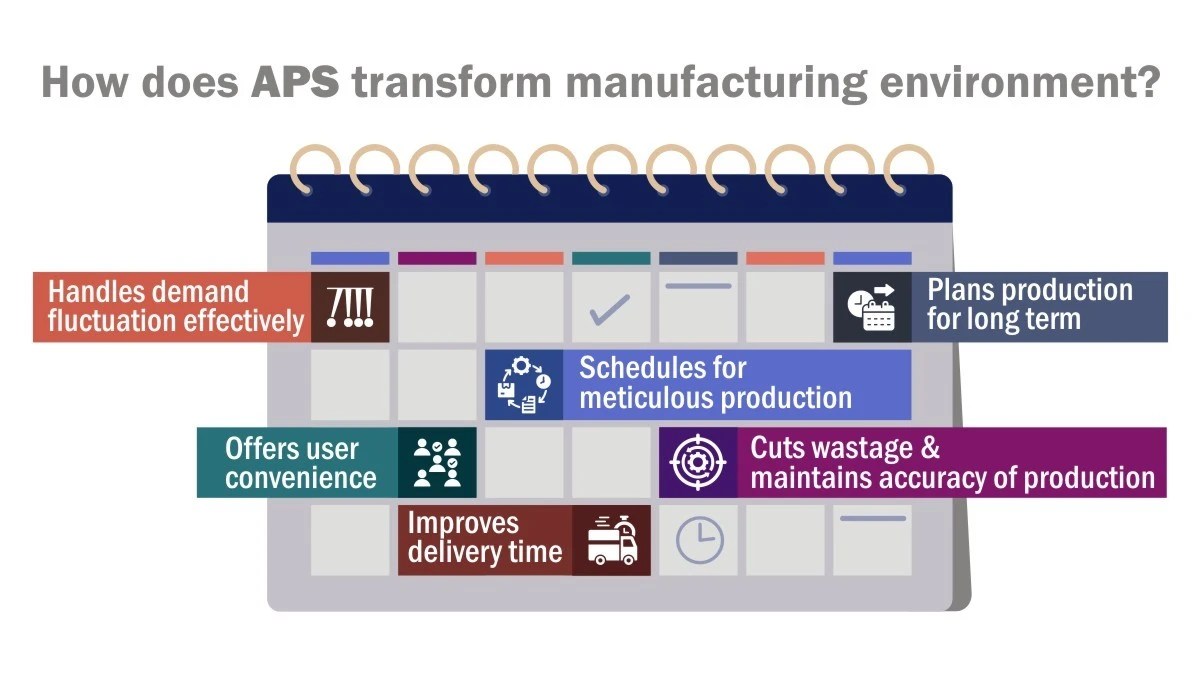Imagine a popular bakery in your neighbourhood that’s known for its fresh pastries every morning. To meet the daily rush, they need to perfectly time when to mix the dough, when to bake, and when to have the goods ready for customers.
Without a well-planned schedule, they could run out of ingredients, overbake batches, or miss peak sales hours—leading to lost revenue and disappointed customers. This is where Advanced Production Scheduling (APS) becomes essential.
Just as the bakery ensures that each step in their process is precisely timed, manufacturers rely on APS to coordinate complex operations, minimize waste, and meet demand efficiently. In this blog, we’ll dive into why APS is critical for staying competitive in the fast-paced world of manufacturing.
What is APS?
Advanced Planning and Scheduling comprises two parts. Advance Planning and Advance Scheduling. Let us break down the two and understand the concept better.
Advance Planning- It is a tool that helps in planning. It plans for days, weeks, months, or makes plan in the combination.
It calculates orders from various sites and consolidates orders for right procurement. MRP data helps planning to ensure that inventory levels are sufficient to carry out production.
Advance Planning takes workforce, machines, labor, materials etc. into consideration. It helps to decide what to make, how much to make, where and when to make.
Advance Scheduling- It takes into consideration all the factors related to production and provides schedules that fit perfectly into the environment. It helps you to take decisions to add overtime, order prioritization, splitting of batches, and help to deal effectively with changing delivery dates.
Advanced Planning and Scheduling (APS) software help manufacturers to find that perfect synchronization between production planning, scheduling and resource optimization.
It takes into consideration various factors such as capacity constraints, raw materials availability, order priorities, and customer demand to create production plans that can be executed efficiently. Hence to explain APS as a whole, we can say with the help of APS, manufacturers can tackle various challenges like unexpected fluctuation demands, raw material requirement, collision of two batches, etc.
APS oversees numerous aspects of production like:
- Master Production schedule creation
- BOM level planning
- Make-to-order planning
- Make-to-stock planning
- Advance scheduling
- Order-based constraint scheduling
- and more.

Handles demand fluctuation effectively–
Demands are unpredictable. Even after proper planning, manufacturers have to shift their priorities due to demand fluctuation. Managing fluctuating demands becomes easier with APS.
The APS system allows to schedule production on various process cells and change priorities of production with easy drag and drop method. Thus, manufacturers can stop some batches which are producing low demand products and increase the batches that are producing high demand products.
This easy and swift adjustments offer flexibility to accelerate or slow down production as per demands in the market.
Plans production for long term–
APS system offers long terms planning of production. In general, time horizon can be of days, weeks, months or a combination. This long-term planning steers the whole production cycle on a set path, and allows manufacturers to plan, and strategize for future.
APS allows to try various what-if analysis and compute its impact on overall production. This foresightedness helps manufacturers to react quickly and effectively in times of expected or unexpected changes and adjust schedules accordingly.
On the basis of planning, manufacturers can procure materials, arrange resources, calculate costs, and other factors to ensure that inventory level are apt enough to carry out production without any difficulty.
Schedules for meticulous production–
If planning is for long term, scheduling deals with day-to-day productions and is generally for short term. It considers various factors like raw materials, process cells, orders, priority, etc. Hence, with APS, manufacturers can easily make smart schedules for production to meet demands, and targets.
APS allows manufacturers to edit or modify and visualize production schedules as per the needs.
It leverages you to add user defined tasks, and shift schedules. Adding user defined tasks is very important feature of APS, as it allows you to rectify mistakes of scheduling.
For example, two batches, one containing allergen product and other does not, when processed back-to-back might contaminate the second batch. In absence of APS, if these two batches are scheduled without leaving ample time to clean, both will run in their sequence. By adding user defined task as “cleaning” manufacturers can ensure that both batches are produced with due care.
With Split batch feature of APS, you can split various batches and schedule them for quick production. This is useful particularly when delivery dates are shifted, raw materials are not adequate to carry on complete batch, capacity bottlenecks occur or partial lots of MPS orders need different treatment. Split batch feature helps in partial delivery and avoids production halt.
APS supports forward and backward scheduling. This is useful for both make to order and make to stock production scenario. Hence, manufacturers are always ready to fulfil the demand which eventually fosters customer satisfaction and increases brand loyalty.
User convenience–
Some APS software have an interface which is very convenient to use. It has colourful dashboard. It lets you assign color-codes to batches according to their status viz- new planed, firm planned, uploaded, cancelled, or deleted. The colour coding increases production visibility and enhances convenience in handling various batches.
There are graphical bars that allows to adjust schedules on timeline, and the system automatically calculates all other factors. This convenience saves user from complicated calculations, tiring adjustments and reduces chances of errors or batch collision, hence increases production efficiency.
Cuts wastage and maintains accuracy of production–
APS helps in meticulous planning and scheduling. The software not only sets a path for smooth and hassle-free production, but it also helps to produce only what is needed.
This accuracy of production improves resource utilization, reduces wastage, and minimizes various costs involved like inventory carrying cost, overheads, etc. affecting the bottom-line directly.
Improves delivery time–
With Shipment Viewer capability, APS improves delivery time. Manufacturers can see the shipment pending month-wise/week-wise or day-wise. This feature helps to strategize shipment for faster delivery which will eventually impact positively on customer satisfaction.
If some shipments are getting delayed, you can drill down to find out the reason, and inform customers about the delay, well in advance. This proactive action can cement trust of your customers upon your brand.
Final thought:
Conclusively, Advanced Planning and Scheduling (APS) software is essential for manufacturing because it optimizes production schedules, balances supply and demand, and enhances resource utilization. By providing real-time visibility and detailed planning capabilities, APS software helps manufacturers reduce lead times, minimize inventory costs, and improve overall operational efficiency.
It ensures that production processes run smoothly and aligns resources with market demands, ultimately boosting productivity and profitability.
Some ERP’s provide intensive Advance Planning and Scheduling capabilities to help manufacturers reap all above mentioned benefits in the simplest of way. If you are also looking to adopt an APS solution for your manufacturing, try to explore BatchMaster’s Advance Production and Scheduling solution.
BatchMaster’s APS software acts as a finite capacity scheduling tool, quickly creating detailed schedules based on an in-depth plant model, typically within minutes. It helps
- Apply advanced algorithms and specific sequencing rules tailored to each batch job.
- Schedule tasks with precision based on real-time, actionable data.
- Modify schedules dynamically using ‘What If’ scenarios.
- To leverage Gantt chart visualization for clear scheduling insights.
- Refine schedules according to business priorities, setup optimizations, and attribute-based grouping to alleviate bottlenecks.
- Generate schedules based on constraints such as machine capacity, labour, tooling, and setup durations.
- Respond effectively to real-time changes like equipment downtime, shift adjustments, material shortages, and alterations to sales order deadlines.
For more details, mail us on sales@batchmaster.co.in or contact us here. Meanwhile, don’t forget to visit our website for more information.




















